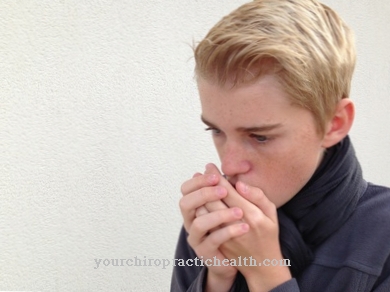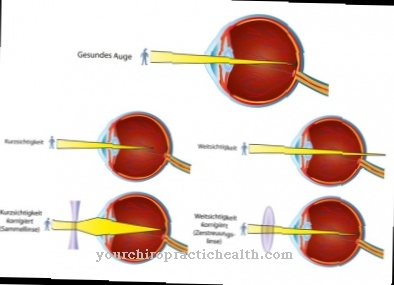According to the definition, means Muscle spasms (special spasm) an unwanted and at the same time inevitable, permanent contraction of a muscle or a muscle group, which is associated with severe pain and limited mobility of the cramping part of the body.
What are muscle cramps?

Muscle cramps can occur spontaneously at rest or after intense muscle exertion. The calves, thighs and hand muscles are most commonly affected, the most common causes being a magnesium deficiency in the body or a calcium deficiency in the blood.
Tetany, which is triggered by the calcium deficiency in the blood, is a spasmodic motor disorder that can manifest itself in a tingling sensation (as a sign of over-excitability of the nerves and muscles) or in a painful spasm. In a muscle spasm, the human body lacks sufficient magnesium to counteract the unwanted contraction.
causes
Muscle cramps are usually caused by overexertion, as is the case with sport, for example, or by a magnesium deficiency. In addition, a lack of sodium chloride or a general lack of fluids can lead to muscle cramps for sporting reasons.
Other possible causes are the wearing of too tight stockings and / or shoes, the presence of varicose veins, the cold or a potassium deficiency (for example caused by excessive sweating).
Due to the illness, muscle cramps can occur more frequently in diabetes patients, in people with circulatory disorders or in the presence of a nervous disease.
The influence of alcohol and the use of certain drugs as triggers are currently being discussed scientifically.
You can find your medication here
➔ Medicines for muscle crampsDiseases with this symptom
- Magnesium deficiency
- Diabetes insipidus
- Mineral deficiency
- Kidney weakness
- Calcium deficiency
- abdominal influenza
- Hypothyroidism
- Myopathy
- Potassium deficiency
- Crohn's disease
- Polyneuropathy
- Lambert-Eaton-Rooke Syndrome
course
If there is a magnesium deficiency, the return of potassium to the cell is interrupted. However, this is important to stop the electrical excitation and the influx of calcium ions into the smallest unit of the muscles, the sarcomere. If this does not go smoothly, muscle spasms, i.e. continuous muscle contraction, can occur.
This manifests itself in sudden, severe muscle pain. This occasionally results in a feeling of numbness and restricted mobility in the cramped part of the body, as well as hardening and possible swelling of the muscle.
Usually, however, this goes away quickly. The pain that is triggered can, however, outlast the cramp. The muscles of the feet and lower legs and the hand muscles are most stressed when doing sports. Because of this, muscle cramps occur most frequently there (the same applies to less sporty people).
When should you go to the doctor?
Muscle cramps that are caused by a short-term magnesium deficiency or diarrheal disease usually do not require treatment. The cramps often manifest themselves in the calf muscles, but occasionally also in the feet or the lateral back muscles. If the muscle cramps occur only occasionally, the person concerned does not have to see a doctor.
But it is different if the patient frequently suffers from muscle cramps. If he is active in sports, the muscle cramps can indicate incorrect loads or insufficient warm-up exercises for the muscles. In order to clarify the cause of the cramps, a visit to the sports specialist is useful. He can also ask questions about eating habits. Muscle spasms can occur in athletes, as in the elderly, as a result of dehydration and profuse sweating. A temporary lack of fluids and mineral salts can easily be compensated for by yourself.
It is advisable to see a doctor if you suffer from frequent muscle cramps. Those affected should pay attention to accompanying symptoms. If you have headache and back pain, night sweats or a feeling of weakness in the whole muscular system, it is advisable to see a doctor. The same applies if gait or movement uncertainties or fatigue and fatigue occur. Since muscle cramps can accompany high blood pressure, type 2 diabetes, or kidney disease, they are a serious symptom. They may indicate a disease that has not yet been recognized, such as an arterial circulation disorder.
Doctors & therapists in your area
Treatment & Therapy
However, since the causes of muscle spasms have not yet been fully understood by science and several factors are likely to come together in a muscle spasm, no causal treatment is currently available. It can only treat the symptoms and prevent muscle spasms.
If a muscle spasm occurs, the movement should be stopped immediately and the muscle either stretched or actively relaxed. Light massages and rubbing in certain ointments and creams are just as effective. Movement should only be continued after the spasm has resolved.
In sports, you should also ensure that you drink enough fluids after a cramp. If it is the case that more and more muscle cramps occur, a doctor must be consulted to clarify the cause. If necessary, they will prescribe physiotherapy or, in rare cases, therapy with muscle-loosening and anti-inflammatory drugs.
Outlook & forecast
Muscle cramps in the legs or back can feel dramatic. However, they are often due to a momentary deficiency or excessive consumption of magnesium. Before and after exercise, in the event of dehydration or severe stress, it can therefore be useful to take magnesium and calcium as a preventive measure. In acute cases, there is the prospect of getting rid of muscle cramps quickly with a quick supply of minerals.
However, the prognosis is much worse if the muscle cramps are the result of a serious illness. For example, amyotrophic lateral sclerosis (ALS) or a cerebral seizure are possible. Muscle cramps can also develop as a consequence of hormonal disorders and metabolic diseases such as diabetes. Anyone who takes laxatives or dehydrating agents (diuretics), medication for high blood pressure or similar preparations should also improve their mineral supply preventively.
How the prognosis for muscle cramps looks in detail always depends on the underlying disease. A balanced electrolyte balance plays a key role in preventing muscle cramps. If muscle cramps occur despite a regular supply of electrolytes or minerals, the person affected should think of an internal or neurological disease. In this case it is probably not idiopathic or paraphysiological muscle spasms, but rather symptomatic ones. This worsens the prognosis for muscle cramps at least as long as the underlying disease remains untreated.
You can find your medication here
➔ Medicines for muscle crampsprevention
Home remedies ↵ for cramps A muscle spasm can be prevented by an adequate intake of fluids and magnesium. Magnesium can be taken in the form of tablets, which can be purchased without a prescription in online pharmacies and drug stores, or with food. Foods rich in magnesium include nuts, spinach and whole grain products.
You should also warm up sufficiently before exercising. Circulatory measures such as gymnastics and contrast baths can also have a positive effect.
It is also advisable to reduce the daily consumption of alcohol and coffee and to avoid excessive strain, especially in the initial phase of training. In sport, sufficient stretching after training has a regenerative effect.
In summary, it can be stated that a muscle spasm is understood to mean the unwanted contraction of a certain muscle, which is sometimes accompanied by severe pain and immobility of the body part concerned. This can be prevented well on your own and only in the rarest of cases requires medical treatment or drug therapy.
You can do that yourself
If you have muscle cramps you don't always have to see a doctor. With acute cramps, a warm bath or shower can often help. A hot washcloth has a similar effect and stimulates blood circulation, which eases the spasm. A massage can also bring the longed-for relief from acute muscle cramps.
Severe cramps can be relieved by pressing the cramp point with the thumb two or three times for about ten seconds. Counter-stretching is an effective remedy for mild cramps in the calves and thighs. In the case of severe cramps, on the other hand, it is important to spare the muscles for a few hours. It is also advisable to drink a lot, because the cause of muscle cramps is often a lack of fluids or minerals.
Consumption of whole grain products, nuts or vegetables provides the muscles with the magnesium and potassium they need. Alternative remedies also help. Oil mixtures of wintergreen oil and vegetable oil increase blood circulation and relieve cramps in the calves. Cramps in the legs can be relieved with Toni water. Chronic or particularly severe muscle spasms that cannot be relieved by the measures mentioned should be discussed with a doctor.












.jpg)

.jpg)
.jpg)











.jpg)